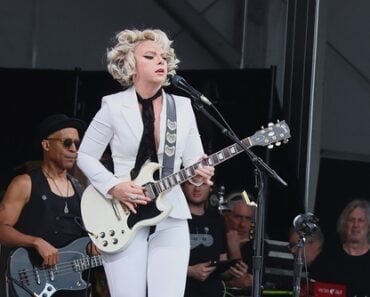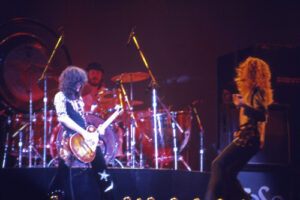
Photo: Caligvla sur Wikipédia anglais, CC BY-SA 3.0 <https://creativecommons.org/licenses/by-sa/3.0>, via Wikimedia Commons
Morrissey stands as one of the most enigmatic figures in the history of British music. Born Steven Patrick Morrissey on May 22, 1959, in Davyhulme, Lancashire, his early years were shaped by the gritty working-class environment of Manchester, where his Irish immigrant parents settled. Growing up in the shadow of economic hardship, he developed a love for literature, particularly drawn to themes of isolation and rebellion, which would later define his music career. Before rising to fame, Morrissey had brief stints with local punk bands, but it was his collaboration with Johnny Marr that launched The Smiths in 1982, propelling him to national recognition.
As the frontman of The Smiths, Morrissey’s unmistakable baritone voice and witty, melancholic lyrics made him a defining figure in 1980s alternative rock. The band’s four studio albums, including Meat Is Murder and The Queen Is Dead, solidified their status as one of the most critically acclaimed groups of the era. With songs that tackled subjects like alienation, personal identity, and political discontent, Morrissey became a voice for those who felt out of place in society. Yet, despite The Smiths’ success, personal differences between Morrissey and Marr led to the band’s breakup in 1987, marking the end of a short but explosive chapter in music history.
In 1988, Morrissey embarked on a solo career with the release of Viva Hate, which reached the top of the UK charts. His solo work continued to explore themes of emotional vulnerability and social commentary, often touching on his own experiences and observations. Albums such as Your Arsenal and Vauxhall and I demonstrated his ability to evolve while maintaining his distinct voice. Over the decades, Morrissey has remained both celebrated and controversial, known for his outspoken views on politics, animal rights, and British society, often attracting both adoration and criticism.
This article explores the top 10 songs from Morrissey’s solo career, focusing on the tracks that highlight his lyrical genius, emotional depth, and unwavering commitment to his unique brand of artistry. From introspective ballads to anthems of defiance, each song offers a glimpse into the mind of an artist who has never shied away from challenging the status quo. As we delve into these songs, we not only celebrate Morrissey’s music but also acknowledge the complexities that have made him a cultural icon for more than four decades.
# 10 – Now My Heart is Full
Opening the list of top 10 Morrissey songs is “Now My Heart is Full,” a stunning track from his 1994 album Vauxhall and I. This song marks a pivotal point in Morrissey’s career, as it reflects his transition into adulthood and his internal struggle to express everything weighing on his heart. Released as part of his fourth solo album, Vauxhall and I, the song captures Morrissey’s lyrical depth and ability to convey emotional complexity, making it a fan favorite and a defining moment in his career.
The song’s lyrics draw from Graham Greene’s 1938 novel Brighton Rock, referencing the gangsters Dallow, Spicer, Pinkie, and Cubitt. This literary allusion enriches the narrative as Morrissey contemplates loyalty, identity, and emotional release, themes that resonate throughout the track. The repeated refrain, “Now my heart is full,” highlights a mixture of fulfillment and confusion, as Morrissey seems to revel in the chaos of his thoughts and feelings, unsure how to process them fully. His voice delivers these lyrics with poignant sincerity, making the song a perfect embodiment of his brooding yet introspective style.
Recorded in late 1993 at Hook End Manor, the song was produced by Steve Lillywhite, known for his work with U2 and Peter Gabriel. The production, subtle and atmospheric, allows Morrissey’s vocals to remain at the forefront while the instrumentation provides a lush backdrop. Boz Boorer, Alain Whyte, and Jonny Bridgwood contributed guitar and bass, respectively, and the arrangement of “Now My Heart is Full” complements Morrissey’s vocal delivery with a serene but emotionally charged soundscape. The song’s subdued build-up allows it to unfurl with grace, capturing the vulnerability Morrissey wanted to communicate at this stage in his life.
As the first song on this list, “Now My Heart is Full” establishes a foundation of introspection, weaving Morrissey’s personal reflections with literary references and sonic elegance. It highlights how Morrissey uses music as a way to unravel complex emotions, setting the tone for the rest of the songs on this list, where his lyrical brilliance and emotional depth continue to take center stage.
# 9- Speedway
“Speedway” stands out as one of Morrissey’s most intense and dramatic tracks, thanks to its electrifying combination of buzzing guitars, raw energy, and introspective lyrics. Featured on his critically acclaimed Vauxhall and I album, released in 1994, “Speedway” immediately captivates with its chainsaw-like guitar riff that slices through the track, setting the tone for an emotionally charged performance. The song is notable for its sonic aggression, paired with Morrissey’s confessional lyrics, which toy with vulnerability and defiance.
The lyrics in “Speedway” reveal a Morrissey who simultaneously acknowledges his faults and revels in his defiance. In the verses, Morrissey confesses that the rumors his enemies have heard about him are not entirely unfounded, hinting at a deeper self-awareness of his flaws. However, as the chorus builds, he turns the situation on its head, refusing to allow those enemies to define him. The repeated refrain, “All of the rumors keeping me grounded, I never said that they were completely unfounded,” highlights his complex relationship with public perception—he acknowledges the truth in criticism but remains steadfast in his self-assuredness. This duality of confession and defiance creates a powerful narrative that is both relatable and cathartic.
The track was recorded at Hook End Manor in late 1993 and was produced by Steve Lillywhite, whose minimalist production allows Morrissey’s vocals to shine while maintaining the raw intensity of the instrumental arrangement. The song’s aggressive guitar work, driven by Boz Boorer and Alain Whyte, contrasts with the vulnerability in Morrissey’s lyrics, creating a tense and captivating atmosphere. Drummer Spencer Cobrin’s dynamic playing adds to the song’s energy, especially during the build-up to the chorus, where Morrissey’s voice soars above the instrumentation. This contrast between the confrontational sound and introspective lyrics makes “Speedway” one of the most emotionally charged moments on Vauxhall and I.
As we explore the top ten Morrissey songs, “Speedway” serves as a brilliant example of how Morrissey blends lyrical depth with musical intensity. Its ability to simultaneously express vulnerability and defiance places it among Morrissey’s most compelling works. The track’s confessional tone, combined with its sonic aggression, makes it a vital inclusion on this list, standing as a testament to Morrissey’s unique ability to turn personal struggles into anthemic rock moments.
# 8 – Hairdresser On Fire
“Hairdresser on Fire” stands as a testament to Morrissey’s distinctive wit and lyrical creativity, showcasing his ability to craft songs with both humor and depth. Released as the B-side to “Suedehead” in 1988, the song was later included in some reissues of Morrissey’s debut solo album Viva Hate. The track encapsulates Morrissey’s knack for blending playful lyricism with melancholy undertones, creating a paradoxical balance that resonates with fans of both his solo work and his time with The Smiths.
Lyrically, “Hairdresser on Fire” presents a humorous but cutting reflection on the superficiality and obsession with appearance, themes often explored in Morrissey’s music. The song’s protagonist laments about waiting for a hairdresser’s attention while simultaneously expressing deeper concerns about identity and societal expectations. The lyrics—“Can you squeeze me into an empty page of your diary / and psychologically save me / I’ve got faith in you”—hint at the deeper emotional weight beneath the seemingly trivial frustration of waiting for a hair appointment. The reference to Joe Orton’s The Boy Hairdresser reinforces Morrissey’s connection to British literary figures who inspired his distinctive narrative style, adding another layer of cultural commentary.
Musically, the track features a light, upbeat melody that contrasts with Morrissey’s introspective and somewhat sarcastic lyrics. Co-written with Stephen Street, who produced the track alongside Morrissey’s early solo material, the song carries a breezy rhythm, led by jangly guitar work that harkens back to The Smiths’ signature sound. This combination of bouncy instrumentation and wry lyricism evokes the same dichotomy that made Morrissey’s work with The Smiths so compelling. The production, recorded at Wool Hall Studios, ensures that the vocals remain front and center, allowing Morrissey’s playful delivery to shine.
“Hairdresser on Fire” exemplifies Morrissey’s ability to turn mundane scenarios into reflective commentary on larger societal issues. In the context of this top ten list of Morrissey songs, it stands out as an example of his lighter side, with witty lyrics that playfully disguise deeper meanings. Its lively melody and flirty charm contrast with more intense tracks, offering a moment of levity without losing Morrissey’s trademark introspective touch.
# 7 – We Hate It When Our Friends Become Successful
“We Hate It When Our Friends Become Successful” is one of Morrissey’s most biting and ironic tracks, taken from his 1992 album Your Arsenal. The song is driven by an infectious rock rhythm, courtesy of guitarist Alain Whyte and drummer Spencer Cobrin, with strong production from Mick Ronson, famously known for his work with David Bowie. The song showcases Morrissey at his sarcastic best, delivering a critique of envy and bitterness in an unusually upbeat musical package. The track was recorded at the famous Redwood Studios in London, highlighting Morrissey’s growing connection to the British rock scene of the early ’90s.
Lyrically, Morrissey taps into a human emotion many of us might be reluctant to admit—jealousy towards the success of our friends. His disdain is delivered with tongue-in-cheek humor as he sings, “We hate it when our friends become successful / And if they’re Northern, that makes it even worse.” His playful lyrics, paired with the energetic rock backing, create a disarming contrast, masking the underlying frustration with a jaunty melody. The chorus itself replaces lyrics with Morrissey’s exaggerated laughter, further driving home the absurdity of these sentiments and giving the song a uniquely personal touch.
Musically, “We Hate It When Our Friends Become Successful” stands out for its upbeat rock sound, a departure from some of the darker tones seen in other Morrissey tracks. The song’s lively instrumentation complements its satirical lyrics, making it one of the more light-hearted yet pointed entries in Morrissey’s catalog. While the song’s message of envy is universal, Morrissey wraps it in his signature wit and irony, inviting listeners to reflect on their own feelings of jealousy while enjoying the song’s infectious rhythm. As the first single from Your Arsenal, this track sets the tone for Morrissey’s continuing exploration of more rock-oriented sounds in the early ’90s.
# 6 – The More You Ignore Me, The Closer I Get
“The More You Ignore Me, The Closer I Get” stands as one of Morrissey’s most iconic tracks from his 1994 album Vauxhall and I. Produced by Steve Lillywhite, the song was recorded at Hook End Manor in England, and it was the lead single from the album, marking Morrissey’s return to commercial success. The track reached No. 8 on the UK Singles Chart and made its mark on the Billboard Hot 100 in the U.S., where it peaked at No. 46—his highest charting U.S. single. The song is built around a catchy guitar riff by Boz Boorer, with Alan White’s drums and Jonny Bridgwood’s bass providing a solid rhythm section. Its production is notably lush, fitting for a track that encapsulates Morrissey’s ability to balance tenderness and obsession.
Lyrically, Morrissey navigates the themes of love and obsession in a way that only he can. The chorus, with its direct and unsettling line “The more you ignore me, the closer I get / You’re wasting your time,” reflects an intensity of feeling that teeters between romantic devotion and alarming persistence. The song’s irony lies in the juxtaposition of Morrissey’s almost menacing lyrics with the soothing, melodic instrumental backdrop. This duality is where the track shines, encapsulating the paradox of Morrissey’s persona: the lovelorn poet who, despite rejection, finds resolve in the pursuit of love.
Musically, “The More You Ignore Me, The Closer I Get” shares similarities with other tracks on Vauxhall and I, such as “Now My Heart Is Full,” as both songs explore themes of inner conflict and emotional vulnerability. However, this track leans more heavily into the notion of unrequited love and the strange dynamics that often come with it. The song’s hypnotic repetition underscores the obsession Morrissey portrays, while its upbeat tempo contrasts with the darker themes, creating a poignant yet accessible sound. With its commercial success and artistic depth, this song is a standout entry in Morrissey’s catalog and highlights his unique ability to turn complex emotions into memorable music.
# 5 – You’re The One for Me Fatty
Released in 1992 as the third single from Morrissey’s Your Arsenal, “You’re The One for Me, Fatty” is one of the more playful and upbeat tracks from the singer’s catalog. Co-written with guitarist Alan Whyte, this song was recorded at the famous Hook End Manor in Oxfordshire, England, under the production of glam rock legend Mick Ronson. Your Arsenal marked a shift in Morrissey’s sound towards a more rock-oriented approach, and this track is no exception with its driving rhythm and catchy guitar riff. Despite its more lighthearted sound, the song reached No. 19 on the UK Singles Chart, marking yet another successful release for Morrissey during his solo career in the early ’90s.
While the title may suggest a humorous ode to an overweight lover, the song’s lyrics tell a different story. Morrissey’s words are infused with irony, self-deprecation, and a keen sense of wit. The title “Fatty” was not meant to poke fun at anyone’s weight but was an in-joke between Morrissey and Madness singer Chas Smash, who had jokingly referred to himself as the subject of the song. This layering of personal references and inside jokes adds a depth to the song’s meaning, making it one of Morrissey’s more playful yet enigmatic works.
Musically, the song’s upbeat and bouncy rhythm stands in contrast to some of the more introspective tracks on Your Arsenal, like “We Hate It When Our Friends Become Successful.” While the latter dwells on envy and resentment, “You’re The One for Me, Fatty” brings a lighter, more jubilant energy. Morrissey’s lyrical delivery, paired with the melodic guitar work and Ronson’s polished production, helps this song strike a balance between humor and sentimentality. With its memorable chorus and infectious energy, the track continues to resonate with fans, making it a fitting entry in any top ten list of Morrissey’s best songs.
# 4 – Irish Blood, English Heart
“Irish Blood, English Heart” marked Morrissey’s return to the music scene after a lengthy hiatus and became one of his defining songs in the twenty-first century. Released as the lead single from his 2004 album You Are the Quarry, the track was recorded at Sarm Hook End Studios in Oxfordshire, with Jerry Finn serving as producer. The song features Morrissey’s signature biting lyrics paired with a driving rhythm and a blend of rock and post-punk elements. It reached number three on the UK Singles Chart, demonstrating the lasting appeal of Morrissey’s music.
Lyrically, “Irish Blood, English Heart” delves into the conflict between Morrissey’s Irish roots and his English upbringing. The song critiques the political establishment in Britain, targeting both the Labour and Conservative Parties, as well as the British monarchy. Morrissey’s lyrics reflect his deep-seated disillusionment with the country’s historical and political figures, as he expresses a desire for personal and national identity beyond the oppressive systems in place. Lines like “I’ve been dreaming of a time when / To be English is not to be baneful” underscore the artist’s struggle with his own heritage, making this one of his most politically charged songs.
Musically, the song’s fierce tempo and sharp guitar work complement Morrissey’s impassioned vocal delivery. It stands in contrast to other songs on the You Are the Quarry album, such as the more contemplative “Let Me Kiss You.” While many of Morrissey’s tracks from this era reflect introspective or emotional themes, “Irish Blood, English Heart” leans heavily on sociopolitical critique, making it unique in his discography. The combination of its pointed message and robust musical composition has ensured its place as one of Morrissey’s most important and celebrated works.
# 3 – First of The Gang to Die
Still from his 2004 album You Are the Quarry, “First of the Gang to Die” is an undeniably infectious song that highlights Morrissey’s storytelling prowess. The track, produced by Jerry Finn, brings a blend of catchy melodies with lyrical depth, set in the backdrop of Los Angeles. It is both a nod to Morrissey’s large and devoted Latin fanbase and a powerful tale of youthful rebellion and tragic inevitability. While the song may not have reached the highest chart positions, it remains one of Morrissey’s most beloved tracks, particularly in live performances.
The song tells the story of Hector, a young gang member who, despite his mischief and crime, is depicted as a loveable and somewhat heroic figure. Hector becomes the “first of the gang to die,” and the song reflects on the tragedy of wasted youth and the fleeting nature of life. Morrissey’s lyrics blur the lines between celebration and lament, leaving the listener to grapple with the moral complexity of idolizing a character whose life ends in violence. Lines like “And he stole from the rich and the poor / And the not-very-rich and the very poor” highlight Hector’s contradictions, giving the narrative both charm and sadness.
Musically, “First of the Gang to Die” is driven by jangly guitars and an upbeat rhythm that contrasts the somber subject matter. This juxtaposition between sound and story creates a unique dynamic, where the listener is drawn into the song’s infectious melody while pondering its tragic themes. The song’s mix of youthful defiance, street life, and ultimate loss has made it a standout in Morrissey’s later catalog, capturing both the energy of You Are the Quarry and the artist’s longstanding ability to connect with marginalized, often overlooked voices.
# 2 – Everyday is Like a Sunday
“Everyday Is Like Sunday,” from Morrissey’s debut solo album Viva Hate (1988), is a hauntingly beautiful ballad that captures the essence of isolation and gloom. Released as the second single from the album, it quickly became one of Morrissey’s signature songs, cementing his place as a key figure in British alternative music. The track, produced by Stephen Street, combines melancholic melodies with deeply introspective lyrics, painting a vivid picture of the drudgery of seaside towns where “every day is silent and gray.”
The song reflects Morrissey’s literary tendencies, with the setting and mood evoking a sense of alienation. The lyrics express the stagnant monotony of life in these desolate towns, where the melancholy stretches endlessly, like a dull, perpetual Sunday. Lines such as “Come, Armageddon! Come!” suggest a desire for an escape, even if it comes through destruction. Beneath its picturesque seaside imagery, the song grapples with deeper themes of depression and the feeling of being trapped in an unchanging, uninspiring environment. The mood of “Everyday Is Like Sunday” draws comparisons to the fog of depression, where each day feels indistinguishable from the last.
Musically, the song showcases Morrissey’s ability to craft an emotive atmosphere through his distinct vocal delivery, backed by rich, layered instrumentation. The orchestration, driven by strings and somber guitar lines, enhances the song’s melancholic tone, reinforcing the themes of isolation and longing. Critically praised for both its lyrical depth and melodic beauty, “Everyday Is Like Sunday” remains one of Morrissey’s most enduring and beloved tracks. It resonates with listeners who have experienced the desolate feeling of days blending into one, longing for something to break the monotony.
# 1- Suedehead
“Suedehead” is Morrissey’s first solo single after the dissolution of The Smiths, and it swiftly became his most popular song. Released in February 1988 as the lead single from his debut solo album Viva Hate, “Suedehead” soared to number five on the UK Singles Chart, marking the singer’s most commercially successful solo release to date. Produced by Stephen Street, this song features a bright, jangly guitar melody over Morrissey’s trademark lyrical themes of regret and reflection, establishing it as one of his most enduring tracks.
Lyrically, “Suedehead” seems to address a past relationship, filled with a bittersweet mixture of yearning and guilt. Morrissey’s unique storytelling unfolds through lines like “It was a good lay, good lay,” hinting at unspoken regret or unfulfilled emotional connections. While many interpret the song to be about an old lover, the ambiguity allows it to transcend into a broader commentary on how relationships linger in the mind. The song’s title is borrowed from Richard Allen’s novel Suedehead, about post-skinhead gangs, though the lyrical content of the song doesn’t directly tie into the novel’s subject matter. Instead, Morrissey has mentioned that “Suedehead” reflects elements of his teenage years, adding a layer of personal history to the song’s meaning.
The musical arrangement is equally significant in elevating “Suedehead.” With its catchy, uptempo rhythm, it contrasts with Morrissey’s brooding lyrics, creating a juxtaposition that’s quintessential to his style. The song’s memorable melody, coupled with the light yet stirring guitar work, has helped cement its place as a fan favorite. In comparison to other tracks from Viva Hate, such as “Everyday Is Like Sunday,” “Suedehead” offers a more upbeat, immediate appeal, while still carrying Morrissey’s signature melancholic undertones.
Morrissey Songs Ranked article published on Classic RockHistory.com© 2021
Classicrockhistory.com claims ownership of all its original content and Intellectual property under United States Copyright laws and those of all other foreign countries. No one person, business or any organizations is allowed to republish any of our original content anywhere on the web or in print without our permission.



































